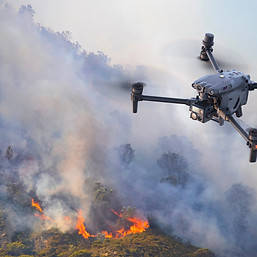
Non-Terrestrial Networks (NTN)
Non-Terrestrial Network (NTN) is a wireless communication system that uses satellites (LEO, MEO, GEO), high-altitude platforms, and drones to extend connectivity beyond terrestrial infrastructure.
Standardized within the 3GPP 5G ecosystem (starting with Release 17), NTN enables direct satellite-to-device communication, providing seamless global coverage. It supports mobile broadband, IoT expansion, and connectivity across aviation, maritime, and remote regions.


IoT-NTN
IoT over NTN combines the Internet of Things (IoT) with Non-Terrestrial Networks (NTN) such as satellites and high-altitude platforms (HAPS), providing reliable connectivity for devices anywhere in the world. It addresses the limitations of terrestrial networks, enabling IoT devices in remote areas, oceans, mountains, and disaster zones to communicate seamlessly.
G-2RK3
High-performance
GNSS/Iridium/NTN Antenna
Multi-band support
NTN n255: TX: 1626.5 ~ 1660.5MHz, RX: 1525 ~ 1559MHz
GNSS L1: 1559 ~ 1606MHz
Iridium: 1616 ~ 1626.5MHz
High-Performance
up to 82% efficiency and 5.9 dBic peak gain
Compact & Flexible
compact form factor, customizable cable and connector options

About MIOT
MIOT is a global provider of wireless and IoT innovations, specializing in antenna design, hardware, and end-to-end manufacturing. With expertise in 5G and NTN, we deliver customizable and cost-effective solutions that keep businesses connected worldwide.
Ready to deploy your NTN network?
Benefits of IoT-NTN
Extended Coverage
Connects remote, rural, and underserved areas, as well as ships at sea and aircraft, expanding global 5G and broadband access.
Low Latency and High Performance
Deliver low-latency service and support high-bandwidth applications despite large cell sizes and satellite movement.
Network Resilience
Provides reliable connectivity during natural disasters, regional conflicts, or terrestrial network outages, ensuring mission-critical communications remain active.
Scalability and Futureproofing
Easily expands network capacity by deploying additional satellites or new constellations without relying on land-based infrastructure.
Risk and Cost Distribution
Distributed satellite networks spread operational risks and reduce overall infrastructure costs.
Enhanced Sensing and Monitoring
Supports environmental monitoring, earth observation, and precision diagnostics in sectors like agriculture.
IoT-NTN Scenarios

Agriculture and farming

Asset Tracking and Logistic

Environmental Monitoring

Maritime
Applications

Disaster Response and Emergency Services

Smart Energy and Utilities










